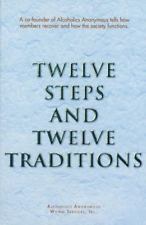

 |
Foreword to Twelve Steps and Twelve Traditions |  |
ALCOHOLICS ANONYMOUS is a worldwide fellow- ship of more than one hundred thousand alcoholic men and women who are banded together to solve their com- mon problems and to help fellow sufferers in recovery from that age-old, baffling malady, alcoholism. (Page 15)The Foreword to Twelve Steps and Twelve Traditions opens with this statement of purpose for the fellowship which borrows language and ideas from the A.A. Preamble (Previously published in the Grapevine). The purpose of this book is then mentioned: "This book deals with the 'Twelve Steps' and the 'Twelve Traditions' of Alcoholics Anonymous. It presents an explicit view of the principles by which A.A. members recover and by which their Society functions." (Page 15) The author also comments two pages later: "The book 'Alcoholics Anonymous' became the basic text of the Fellowship, and it still is. This present volume proposes to broaden and deepen the understanding of the Twelve Steps as first written in the earlier work." (Page 17) [The new, broader understanding of each of the Twelve Steps is examined in the appropriate pages of this AA Book Club website.]
Both for A.A. members and for non-alcoholics, the author explains the functions of the set of principles found in each of the two sections of this book:
A.A.ís Twelve Steps are a group of principles, spiritual in their nature, which, if practiced as a way of life, can expel the obsession to drink and enable the sufferer to be -come happily and usefully whole. A.A.ís Twelve Traditions apply to the life of the Fellow -ship itself. They outline the means by which A.A. main -tains its unity and relates itself to the world about it, the way it lives and grows. (Page 15)Many non-alcoholics, it is said, have been enabled to live better lives through the Twelve Steps. "They see in them a way to happy and effective living for many, alcoholic or not." (Page 16) Interest by students of human relations in the Twelve Traditions is also on the rise. They ask, "How can a set of traditional principles, having no legal force at all, hold the Fellowship of Alcoholics Anonymous in unity and effectiveness?" (Page 16) The section on the Traditions will answer this question, and give an inside view of the fellowship.
A majority of the Foreword is devoted to a brief history of A.A. This treatment is much shorter, and has less detail on the earliest days of the fellowship than the account previously published in the Big Book chapter A Vision For You. We do find out, however, the professions and hometowns of the two co-founders. The author also adds this perspective: "The basic principles of A.A., as they are known today, were borrowed mainly from the fields of religion and medicine..." (Page 16) This is a veiled reference to the Oxford Group, which at this point (1952) still not appear to be explicitly acknowledged in A.A. literature. The medical contribution to A.A. is, of course, Dr. Silkworth and his disease theory of alcoholism, as expressed in The Doctor's Opinion. The history in the Twelve and Twelve, though less detailed, does cover the period after publication of the Big Book through the publication and later adoption of the Twelve Traditions at A.A.'s First International Convention in Cleveland (1950). The Foreword to the Second Edition of the Big Book (1955), which appeared three years after the Twelve and Twelve, has a longer and more detailed discussion of this topic that expands on both of the earlier ones.
The Foreword to the Twelve and Twelve concludes with this look to the future of the fellowship and another purpose for this book:
As A.A. now enters maturity, it has begun to reach into forty foreign lands. In the view of its friends, this is but the beginning of its unique and valuable service. It is hoped that this volume will afford all who read it a close-up view of the principles and forces which have made Alcoholics Anonymous what it is. (Page 18)